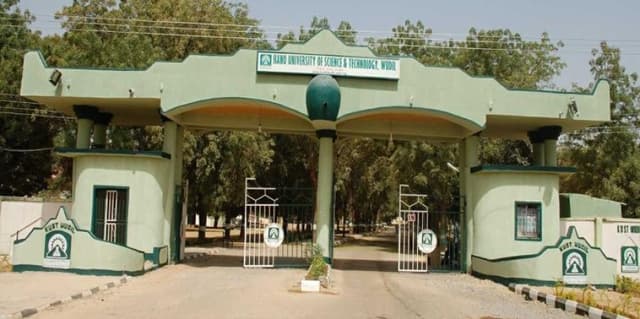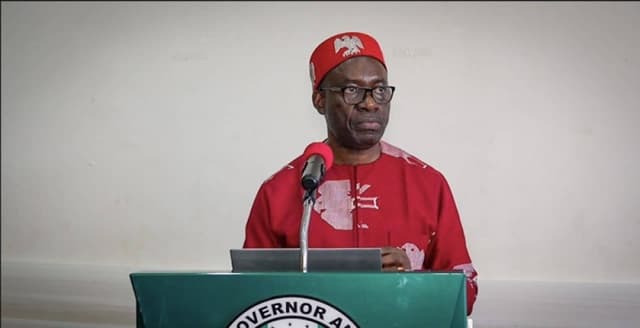
Severely-malnourished Nigerian children
The United Nations Children’s Fund on Tuesday said 3.5 million children in Nigeria are suffering from severe acute malnutrition.
UNICEF Nigeria’s Chief of Field Operations and Emergencies, Judith Leveille, stated this during a joint press briefing held in Abuja, focused on the European Union’s support for victims of the Yelwata crisis in Benue State and the nutrition emergency in the North-East and North-West.
According to her, the situation is dire and requires urgent action, noting that 400,000 children risk preventable deaths in one month and eight days.
She said, “Today, we are gathered because we have a common understanding. More can be done to ensure that all severely acute malnourished children, and we are talking about a burden of 3.5 million children in Nigeria, are treated. The situation is dire. Over the weekend, we met over 100 children who needed urgent treatment. We met little Memunah, little Aisha, their mothers, and of course, my colleagues—the Médecins Sans Frontières, Action Against Hunger, were there at the stabilization centres. We met with committed nurses and doctors who work around the clock with Nigerian medical teams to save children’s lives. That is truly commendable.
“But more needs to be done. What we saw is that nutritional stabilisation centres are already overstretched, and we still haven’t reached the peak of the lean season. We will reach that in about three weeks, and the peak season will last for over a month. What we saw in some communities in Sokoto is not unique.
“It can also be seen in many other states, particularly in the northern parts of Nigeria. So, we need to call on all forces to prevent a stockout of essential nutrition commodities used to treat severe acute malnutrition. As we speak, we can expect a stockout by September 1.
“So, we have one month and eight days to avoid the preventable deaths of over 400,000 children. That’s a lot of children. I’m sure that among them, there could be a Nobel Prize winner, a brilliant scientist who invents a life-saving solution, a great Nigerian musician, or a great actor. Nigeria has the potential to produce such individuals. A lot can be done to prevent this situation. By essential commodities, I’m talking about ready-to-use therapeutic food.”
Leveille emphasised the need not only for funding, but also for skilled personnel and essential medicines.
The Nigeria INGO Forum Director, Camilla Higgins, reiterated that an estimated 3.5 million children are suffering from severe acute malnutrition in the country.
She said, “That’s the equivalent of the national stadium here in Abuja times 60. You would have to fill it 60 times to capture that number of children, and they are all at risk of increased death. This really demands urgent and coordinated action by the government, and we are very ready to support such an effort in coordination with international actors like UNICEF and our member organisations.
“In addition to what we’ve heard about the level of needs this year, we want to highlight that a major contributory factor to this worsening situation is the reduction of resources across the board, particularly from major international donors. We all know what happened earlier this year with the U.S. funding cuts and other major donors reducing their capacity as well.
“I have to highlight that international response capacity is collapsing in the Northeast and Northwest. The response system is stretched beyond its limits. We’ve seen severe acute malnutrition admissions surge up to 40 per cent in the Northeast and 73 per cent in some cities. Malnutrition is now visibly affecting adults, not just children. So, we have even more needs this year and more limited resources, just as we are approaching the peak of the lean season.”
She called on the government to take full leadership in coordinating the response, stating that INGOs are ready to collaborate.
She stressed that this is a preventable crisis and that failure to act costs children’s lives.
On his part, the Head of Mission at MSF, Bilal Ahmad, said the organisation is concerned about the alarming situation of malnutrition, especially in Sokoto State.
“If we look at our site and our observations, what we were supposed to expect at the end of the rainy season, we’re just witnessing now at the start of the rainy season. For example, MSF is supporting 32 Ambulatory Therapeutic Feeding Centre sites and 11 inpatient sites where children come with complications in addition to malnutrition. Our bed capacity is 1,600, which is now not enough.
“In Katsina, we normally have 450 beds, but now we are increasing to 900 beds because we were putting two patients on one bed, and every day the number is increasing. From another state, where we planned for 60 beds during the lean season, we had to increase to 90 beds for the rainy season. Now, the rainy season has just started, and we’re already at 120 beds, and the team is asking for more. We cannot turn patients away. Malnourished children are coming from far away in critical condition, and it is very difficult. I’m really concerned about mortality.
“Our mortality ranges from project to project, location to location—from 3.7 per cent to 7.7 per cent. These could be the children of families who waited a long time to have them, and now they are dying due to malnutrition. We are deeply concerned,” he highlighted.
He noted that many children arrive at the centre after travelling long distances, often too late to be saved.
With patient numbers rising, he warned that the situation will worsen unless immediate actions are taken.
He called for more treatment centres, especially to reduce travel distances, and emphasised the urgent need to increase the supply of therapeutic food, as he emphasised that the current stock is insufficient for the increased caseload.
In his opening remarks, the Minister of State for Humanitarian Affairs and Poverty Reduction, Dr. Yusuf Sununu, emphasised that President Bola Ahmed Tinubu’s agenda focuses on strengthening local and international collaboration, particularly in humanitarian efforts.
He stated that the ministry’s goal is to enhance transparency, accountability, and trust so that international partners feel confident in supporting Nigeria’s humanitarian response.
Sununu reiterated the government’s commitment to ensuring that all collaborative efforts are transparent, traceable, and effective, expressing hope that the partnership will yield positive outcomes for humanitarian governance in Nigeria under President Tinubu. (The PUNCH)



























NEWS EXPRESS is Nigeria’s leading online newspaper. Published by Africa’s international award-winning journalist, Mr. Isaac Umunna, NEWS EXPRESS is Nigeria’s first truly professional online daily newspaper. It is published from Lagos, Nigeria’s economic and media hub, and has a provision for occasional special print editions. Thanks to our vast network of sources and dedicated team of professional journalists and contributors spread across Nigeria and overseas, NEWS EXPRESS has become synonymous with newsbreaks and exclusive stories from around the world.